人教版新目标八年级英语下unit5学案
人教版新目标八年级英语下unit5学案教案资料
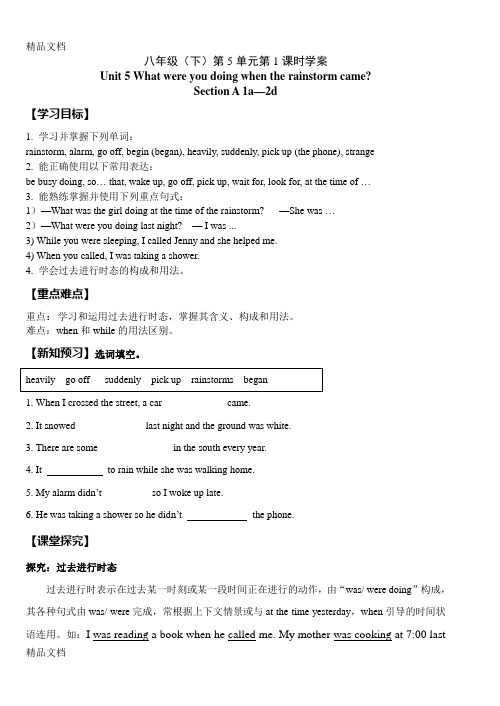
八年级(下)第5单元第1课时学案Unit 5 What were you doing when the rainstorm came?Section A 1a—2d【学习目标】1. 学习并掌握下列单词:rainstorm, alarm, go off, begin (began), heavily, suddenly, pick up (the phone), strange2. 能正确使用以下常用表达:be busy doing, so… that, wake up, go off, pick up, wait for, look for, at the time of …3. 能熟练掌握并使用下列重点句式:1)—What was the girl doing at the time of the rainstorm? —She was …2)—What were you doing last night? — I was ...3) While you were sleeping, I called Jenny and she helped me.4) When you called, I was taking a shower.4. 学会过去进行时态的构成和用法。
【重点难点】重点:学习和运用过去进行时态,掌握其含义、构成和用法。
难点:when和while的用法区别。
【新知预习】选词填空。
1. When I crossed the street, a car ____________ came.2. It snowed _____________ last night and the ground was white.3. There are some ______________ in the south every year.4. It to rain while she was walking home.5. My alarm didn’t _________ so I woke up late.6. He was taking a shower so he didn’t the phone.【课堂探究】探究:过去进行时态过去进行时表示在过去某一时刻或某一段时间正在进行的动作,由“was/ were doing”构成,其各种句式由was/ were完成,常根据上下文情景或与at the time yesterday,when引导的时间状语连用。
人教新目标八年级英语下册教案:Unit 5 教案(1)
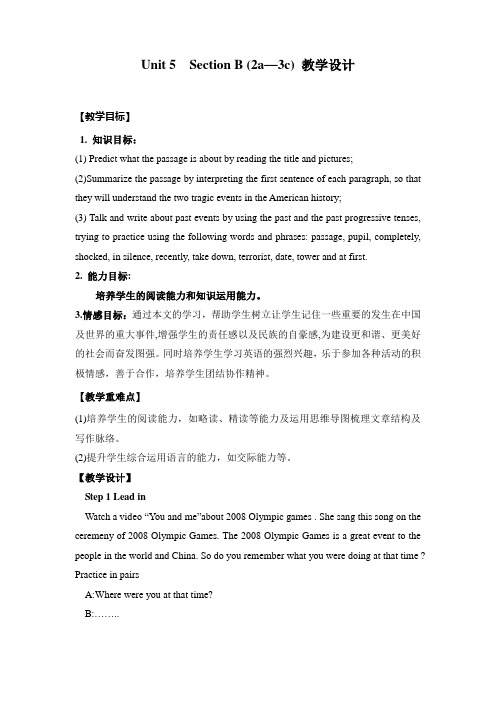
Unit 5 Section B (2a—3c) 教学设计【教学目标】1. 知识目标:(1) Predict what the passage is about by reading the title and pictures;(2)Summarize the passage by interpreting the first sentence of each paragraph, so that they will understand the two tragic events in the American history;(3) Talk and write about past events by using the past and the past progressive tenses, trying to practice using the following words and phrases: passage, pupil, completely, shocked, in silence, recently, take down, terrorist, date, tower and at first.2. 能力目标:培养学生的阅读能力和知识运用能力。
3.情感目标:通过本文的学习,帮助学生树立让学生记住一些重要的发生在中国及世界的重大事件,增强学生的责任感以及民族的自豪感,为建设更和谐、更美好的社会而奋发图强。
同时培养学生学习英语的强烈兴趣,乐于参加各种活动的积极情感,善于合作,培养学生团结协作精神。
【教学重难点】(1)培养学生的阅读能力,如略读、精读等能力及运用思维导图梳理文章结构及写作脉络。
(2)提升学生综合运用语言的能力,如交际能力等。
【教学设计】Step 1 Lead inWatch a video “You and me”about 2008 Olympic games . She sang this song on the ceremeny of 2008 Olympic Games. The 2008 Olympic Games is a great event to the people in the world and China. So do you remember what you were doing at that time ? Practice in pairsA:Where were you at that time?B:……..A: What were you doing at that time?B:I was ……(设计意图:看2008奥运视频歌曲来激发学生学习兴趣,活跃课堂气氛,并借此引出课文中的两个历史事件。
人教新目标八年级英语下册教案:Unit5 教学设计
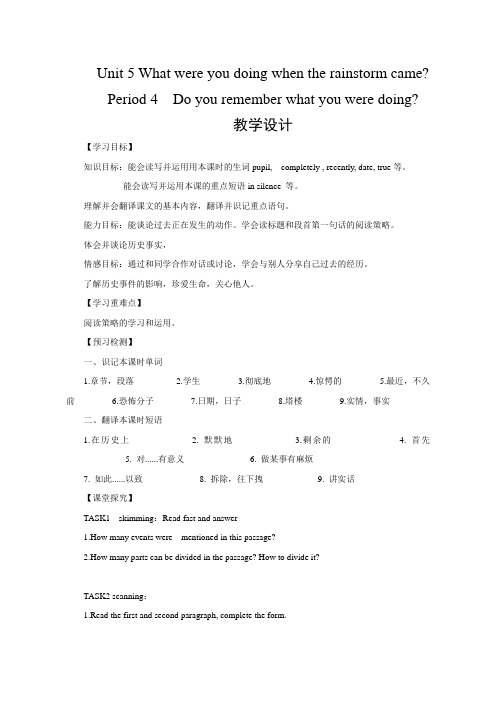
Unit 5 What were you doing when the rainstorm came?Period 4 Do you remember what you were doing?教学设计【学习目标】知识目标:能会读写并运用用本课时的生词pupil, completely , recently, date, true等。
能会读写并运用本课的重点短语in silence 等。
理解并会翻译课文的基本内容,翻译并识记重点语句。
能力目标:能谈论过去正在发生的动作。
学会读标题和段首第一句话的阅读策略。
体会并谈论历史事实,情感目标:通过和同学合作对话或讨论,学会与别人分享自己过去的经历。
了解历史事件的影响,珍爱生命,关心他人。
【学习重难点】阅读策略的学习和运用。
【预习检测】一、识记本课时单词1.章节,段落_________2.学生________3.彻底地________4.惊愕的________5.最近,不久前________6.恐怖分子________7.日期,日子________8.塔楼________9.实情,事实________二、翻译本课时短语1.在历史上_____________2. 默默地_____________3.剩余的_____________4. 首先_____________5. 对......有意义_____________6. 做某事有麻烦_____________7. 如此......以致_____________8. 拆除,往下拽____________ 9. 讲实话________【课堂探究】TASK1 skimming:Read fast and answer1.How many events were mentioned in this passage?2.How many parts can be divided in the passage? How to divide it?TASK2 scanning:1.Read the first and second paragraph, complete the form.What was the event?When did it happen?Where did it happen?What was Robert Allendoing?How did his parents feel?2.Read the third and forth paragraph, complete the form.What was the event?When did it happen?Where did it happen?What was Kate doing?How did she feel?TASK 3 Careful reading1.“T”for true and “F” for false. “NG” for not given.__ 1)Everyone in American remembers who killed Dr. King.__ 2)Robert Allen was eating lunch when Dr. King was killed.__ 3)Robert’s parents were shocked to hear the news.__ 4)Kate Smith was watching a movie when a plane hit the World Trade Center.__ 5)At fir st, Kate didn’t think her friend was telling the truth about the event.2. Find out sentences from the passage with similar meanings to the ones below.1)Not everyone will remember who killed him, but they can remember what they were doingwhen they heard that he got killed.2)No one said anything for the rest of dinner.3)September 11, 2001— the date alone means something to most people in the US.4)I had trouble thinking clearly after that because I was very afraid.TASK 3 Group workDo you have any unforgettable events in your life? Talk about it in your groups and report it to others.Examples:When my parents bought me a new computer, I was…….When I heard that I passed an exam., I was……I was doing….when I got a letter from my best friend.My f riends had an interesting birthday party for me. When I heard the news, I was…..【当堂达标】Try to retell according to the text.People often ________ what they ________ when they _____ the news of important _____ in history. For example, Dr. Martin. Luther King was ______ on April 4,1968.Robert Allen _________ dinner in the _____ with his parents _____ he _____ the news that Dr. Martin Luther King died. His parents were completely _______. Kate Smith __________ in her office ____ the World Trade Center ______________ by terrorists. At first she couldn’t believe but then she looked ______ of the window and realized that it was true. She was so ________ that she could ______ think ______ after that.。
人教版新目标八年级英语下unit5教(学)案
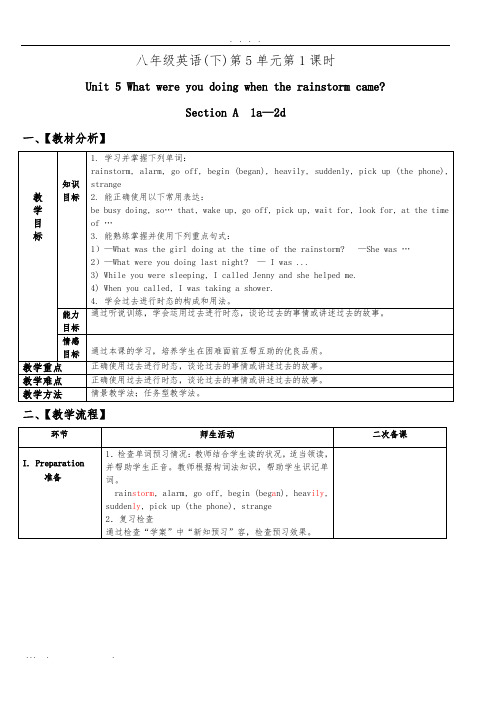
八年级英语(下)第5单元第1课时Unit 5 What were you doing when the rainstorm came?Section A 1a—2d一、【教材分析】二、【教学流程】三、【板书设计】四、【教后反思】八年级英语(下)第5单元第2课时Unit 5 What were you doing when the rainstorm came?Section A 3a—3c一、【教材分析】二、【教学流程】三、【板书设计】四、【教后反思】八年级英语(下)第5单元第3课时Unit 5 What were you doing when the rainstorm came?Section A Grammar Focus—4c一、【教材分析】二、【教学流程】三、【板书设计】四、【教后反思】八年级英语(下)第5单元第4课时Unit 5 What were you doing when the rainstorm came?Section B 1a—1d一、【教材分析】二、【教学流程】三、【板书设计】四、【教后反思】八年级英语(下)第5单元第5课时Unit 5 What were you doing when the rainstorm came?Section B 2a—2e一、【教材分析】二、【教学流程】三、【板书设计】四、【教后反思】八年级英语(下)第5单元第6课时Unit 5 What were you doing when the rainstorm came?3a—Self Check一、【教材分析】二、【教学流程】三、【板书设计】四、【教后反思】. . . . .。
八年级英语下unit5教学设计人教版
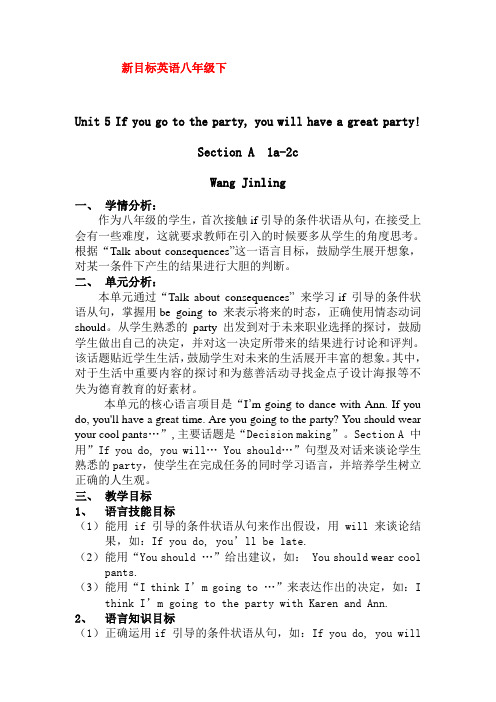
新目标英语八年级下Unit 5 If you go to the party, you will have a great party!Section A 1a-2cWang Jinling一、学情分析:作为八年级的学生,首次接触if引导的条件状语从句,在接受上会有一些难度,这就要求教师在引入的时候要多从学生的角度思考。
根据“Talk about consequences”这一语言目标,鼓励学生展开想象,对某一条件下产生的结果进行大胆的判断。
二、单元分析:本单元通过“Talk about consequences”来学习if 引导的条件状语从句,掌握用be going to 来表示将来的时态,正确使用情态动词should。
从学生熟悉的party 出发到对于未来职业选择的探讨,鼓励学生做出自己的决定,并对这一决定所带来的结果进行讨论和评判。
该话题贴近学生生活,鼓励学生对未来的生活展开丰富的想象。
其中,对于生活中重要内容的探讨和为慈善活动寻找金点子设计海报等不失为德育教育的好素材。
本单元的核心语言项目是“I’m going to dance with Ann. If you do, you'll have a great time. Are you going to the party? You should wear your cool pant s…”,主要话题是“Decision making”。
Section A 中用”If you do, you will… You should…”句型及对话来谈论学生熟悉的party,使学生在完成任务的同时学习语言,并培养学生树立正确的人生观。
三、教学目标1、语言技能目标(1)能用if 引导的条件状语从句来作出假设,用will 来谈论结果,如:If you do, you’ll be late.(2)能用“You should …”给出建议,如: You should wear cool pants.(3)能用“I think I’m going to…”来表达作出的决定,如:I think I’m going to the party with Karen and Ann.2、语言知识目标(1)正确运用if 引导的条件状语从句,如:If you do, you willhave a great time.(2)正确运用表示将来时态的句型,如:I’m going to wear my new jeans.Are you going to the party? Yes, I am.(3)运用what对if引导的句子所产生的结果进行提问,如:What will happen if they have a party tonight?(4)正确运用情态动词 should,如:You should wear your cool pants.3、情感态度目标(1)本单元 Section A 主要围绕“ party ”展开话题,贴近学生实际生活,可以提高他们的学习兴趣,用英语来表达自己的意愿;(2)参与“charity event”的金点子活动海报设计,培养学生的爱心;(3)参与对人生重大事件的讨论,帮助学生树立正确的人生观。
人教新目标八年级英语下册第5单元教案教学设计
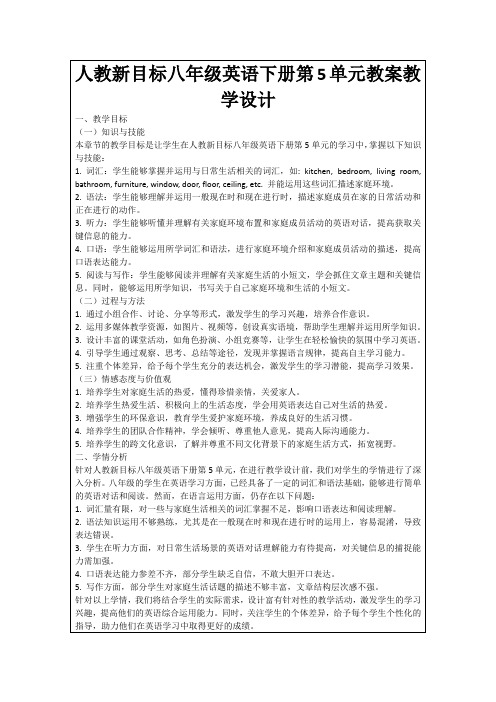
3.重点:培养学生的跨文化意识,使他们能够在了解和尊重不同文化背景的基础上,进行有效的语言交流。
难点:如何将文化教育融入到英语教学中,让学生在实际语言运用中自然地体现出跨文化交际能力。
(二)教学设想
1.创设情境:利用多媒体教学资源,如视频、图片等,为学生创设真实的家庭生活场景,使他们在情境中感知和运用所学知识。
2.互动教学:采用小组合作、角色扮演等方式,鼓励学生主动参与课堂,提高他们的口语表达能力和听力理解能力。
3.分层教学:针对学生的个体差异,设计不同难度的教学任务,使每个学生都能在适合自己的层面上得到提高。
4.激励评价:注重过程性评价,及时给予学生积极反馈,激发他们的学习兴趣和自信心。
5.课后拓展:布置与家庭生活相关的课后作业,如写作、调查问卷等,巩固所学知识,提高学生的实际应用能力。
5.培养学生的跨文化意识,了解并尊重不同文化背景下的家庭生活方式,拓宽视野。
二、学情分析
针对人教新目标八年级英语下册第5单元,在进行教学设计前,我们对学生的学情进行了深入分析。八年级的学生在英语学习方面,已经具备了一定的词汇和语法基础,能够进行简单的英语对话和阅读。然而,在语言运用方面,仍存在以下问题:
5.注重个体差异,给予每个学生充分的表达机会,激发学生的学习潜能,提高学习效果。
(三)情感态度与值观
1.培养学生对家庭生活的热爱,懂得珍惜亲情,关爱家人。
2.培养学生热爱生活、积极向上的生活态度,学会用英语表达自己对生活的热爱。
3.增强学生的环保意识,教育学生爱护家庭环境,养成良好的生活习惯。
4.培养学生的团队合作精神,学会倾听、尊重他人意见,提高人际沟通能力。
人教版新目标八年级英语下unit5学案
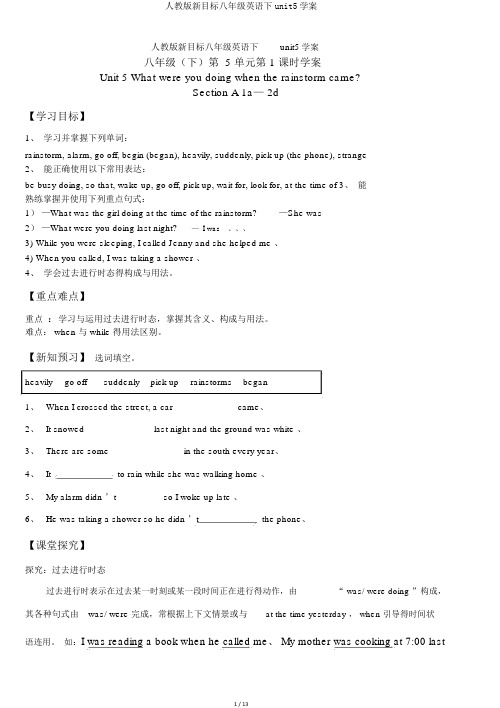
人教版新目标八年级英语下unit5学案八年级(下)第 5 单元第 1 课时学案Unit 5 What were you doing when the rainstorm came?Section A 1a— 2d【学习目标】1、学习并掌握下列单词:rainstorm, alarm, go off, begin (began), heavily, suddenly, pick up (the phone), strange2、能正确使用以下常用表达:be busy doing, so that, wake up, go off, pick up, wait for, look for, at the time of 3、能熟练掌握并使用下列重点句式:1)—What was the girl doing at the time of the rainstorm?—She was2)—What were you doing last night?—I was、、、3)While you were sleeping, I called Jenny and she helped me 、4)When you called, I was taking a shower 、4、学会过去进行时态得构成与用法。
【重点难点】重点:学习与运用过去进行时态,掌握其含义、构成与用法。
难点: when 与 while 得用法区别。
【新知预习】选词填空。
heavily go off suddenly pick up rainstorms began1、When I crossed the street, a car ____________ came、2、It snowed _____________ last night and the ground was white 、3、There are some ______________ in the south every year、4、It to rain while she was walking home 、5、My alarm didn ’t_________ so I woke up late 、6、He was taking a shower so he didn ’t the phone、【课堂探究】探究:过去进行时态过去进行时表示在过去某一时刻或某一段时间正在进行得动作,由“ was/ were doing ”构成,其各种句式由was/ were 完成,常根据上下文情景或与at the time yesterday , when 引导得时间状语连用。
人教新目标八年级英语下册教案:Unit5 教案
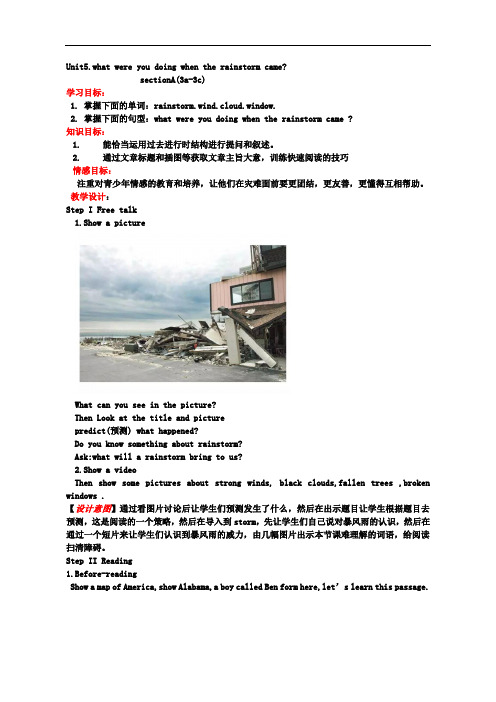
Unit5.what were you doing when the rainstorm came?sectionA(3a-3c)学习目标:1. 掌握下面的单词:rainstorm.wind.cloud.window.2. 掌握下面的句型:what were you doing when the rainstorm came ?知识目标:1.能恰当运用过去进行时结构进行提问和叙述。
2.通过文章标题和插图等获取文章主旨大意,训练快速阅读的技巧情感目标:注重对青少年情感的教育和培养,让他们在灾难面前要更团结,更友善,更懂得互相帮助。
教学设计:Step I Free talk1.Show a pictureWhat can you see in the picture?Then Look at the title and picturepredict(预测) what happened?Do you know something about rainstorm?Ask:what will a rainstorm bring to us?2.Show a videoThen show some pictures about strong winds, black clouds,fallen trees ,broken windows .【设计意图】通过看图片讨论后让学生们预测发生了什么,然后在出示题目让学生根据题目去预测,这是阅读的一个策略,然后在导入到storm,先让学生们自己说对暴风雨的认识,然后在通过一个短片来让学生们认识到暴风雨的威力,由几幅图片出示本节课难理解的词语,给阅读扫清障碍。
Step II Reading1.Before-readingShow a map of America,show Alabama,a boy called Ben form here,let’s learn this passage.AAlabanmaAmericaBen2.while-readinggbeforeafterwhileRainstormPara____Para____Para____Read and find out the main idea of each para1.234【设计意图】(通过通读全文,对文章有根有个大体的了解,让学生学会概括文章大意,了解文章的线索为暴风雨前的准备,暴风雨中和暴风雨后的状态) 2) Read. Para1.2 and answer the questions 1.What was the weather like before the heavy rain started?2.What were Ben’s Dad and mom doing before the rainstorm? 3.Check out the answers then complete our mind-mapbeforeafterwhileWeather motherfather RainstormActivitieskoodworking【设计意图】(通过对1.2两段的阅读,给学生储存一定的信息,层层推进) 3).Read Para.3 and find the answers1What was Ben doing at the time of rainstorm? 2What did they do after dinner?were they happy?beforeafterwhile ActivitiesWeathermotherfatherBenfeelingsRainstormActivitiesHe was helping his mom make dinner They tried to play a card game.【设计意图】本段是对暴风雨中发生的事情,完善思维导图) 4).Read Para4 and find the answers 1.what was the neighborhood like after the storm?2.what did Ben and his family do then?3.what did the writer think of the storm?【设计意图】本段设计的问题是层层推进的,对最后的共建家园而设计,完善思维导图) 5).summarybeforeafterwhile ActivitiesWeatherenvironmentmotherfatherBenfeelingsRainstormActivitiesfeelingsActivitiessupe manyand【设计意图】通过对暴风雨前中后的细读,让学生对文章有更深入的了解,根据每一段的重要信息,完善时间表,为最后的复述做铺垫。
- 1、下载文档前请自行甄别文档内容的完整性,平台不提供额外的编辑、内容补充、找答案等附加服务。
- 2、"仅部分预览"的文档,不可在线预览部分如存在完整性等问题,可反馈申请退款(可完整预览的文档不适用该条件!)。
- 3、如文档侵犯您的权益,请联系客服反馈,我们会尽快为您处理(人工客服工作时间:9:00-18:30)。
人教版新目标八年级英语下u n i t5学案-CAL-FENGHAI-(2020YEAR-YICAI)_JINGBIAN八年级(下)第5单元第1课时学案Unit 5 What were you doing when the rainstorm cameSection A 1a—2d【学习目标】1. 学习并掌握下列单词:rainstorm, alarm, go off, begin (began), heavily, suddenly, pick up (the phone), strange 2. 能正确使用以下常用表达:be busy doing, so… that, wake up, go off, pick up, wait for, look for, at the time of …3. 能熟练掌握并使用下列重点句式:1)—What was the girl doing at the time of the rainstorm? —She was …2)—What were you doing last night — I was ...3) While you were sleeping, I called Jenny and she helped me.4) When you called, I was taking a shower.4. 学会过去进行时态的构成和用法。
【重点难点】重点:学习和运用过去进行时态,掌握其含义、构成和用法。
难点:when和while的用法区别。
【新知预习】选词填空。
1. When I crossed the street, a car ____________ came.2. It snowed _____________ last night and the ground was white.3. There are some ______________ in the south every year.4. It to rain while she was walking home.5. My alarm didn’t _________ so I woke up late.6. He was taking a shower so he didn’t the phone.【课堂探究】探究:过去进行时态过去进行时表示在过去某一时刻或某一段时间正在进行的动作,由“was/ were doing”构成,其各种句式由was/ were完成,常根据上下文情景或与at the time yesterday,when引导的时间状语连用。
如:I was reading a book when he called me. My mother was cooking at 7:00 last night.2【达标练习】一、用when或 while完成下列句子。
1. What were you doing Fei Junlong and Nie Haisheng got out of the Shenzhou VI?2. I met Mr. Wang I was walkin g to school.3. Allen called, the twins were playing table tennis.4. it was raining heavily, two men arrived at my house.二、用所给动词的适当形式填空。
1.What you (do) while your brother was playing computer games?2.I ________ (write) a letter when my mother came in.3.Tina _____ (not read) a book when the bell rang.4.While Tom (take) a shower his room, a man called him.5.We _____ (shop) at the mall at this time last night.三、按括号内要求完成下列句子。
1. His sister was waiting for the bus when the rainstorm came._______ his sister ________ _________ for the bus, the rainstorm came.(用while改写这个句子)2. I was helping mom cook while my brother was doing homework.1) I ________ ________ mom cook while my brother was doing homework.(改为否定句)2) ______ ______ helping mom cook while my brother was doing homework(改为一般疑问句)_______, I _______. / _______, I ________. (作出肯定和否定回答)3) ________ _________ you ________ while my brother was doing homework(对划线部分提问)33. When she arrived home, I was busy ____________(look)after my little sister. (动词填空)4. He was _________ tired _______ (如此……以致于) he went to bed early last night. (汉译英)5. It was raining _____________ (heavy), so he got wet. (适当形式填空)6. The old house fell down _____________(sudden) in the heavy rain. (适当形式填空)【学后反思】_________________________________________________________________________ _______________________________________________________________________八年级(下)第5单元第2课时学案Unit 5 What were you doing when the rainstorm cameSection A 3a—3c【学习目标】1. 学习并掌握下列单词:storm, wind, light, report, area, wood, window, flashlight, match, beat, against, asleep, rise, fallen, apart,2. 能正确使用以下常用表达:with a serious storm happening outside, make sure, fall asleep, die down, in a mess, clean up3. 能熟练掌握并使用下列重点句式:1)Black clouds were making the sky very dark.2)With no light outside, it felt like midnight.3) It was hard to have fun with a serious storm happening outside.4) Although the storm broke many things apart, it brought families and neighbors closer together.4. 学会过去进行时态的构成和用法。
【重点难点】熟练运用“was / were + doing结构”谈论过去某个时间正在发生或进行的事情。
【新知预习】根据所给汉语提示完成句子。
1. The baby ___________ ___________ (睡着) when she arrived.42. The Internet made people _________ __________(更紧密地在一起).3. Could you please help to __________ __________ (清理) the neighborhood?.4. With no light outside, it __________ ___________ ___________(感觉像午夜) at that time.5. __________ ___________ (确信) the flashlight and radio were working.6. The wind are __________ ____________ (逐渐消失) at 3:00 a.m. in the end.7. The rain began to ___________ ___________ ___________(强烈地击打着) the window.【课堂探究】探究:过去进行时常用的标志词有:1)at 9 o’clock yesterday, from 8:00 to 9:00 yesterday morning, at this/that time yesterday2) 主句(过去进行时)+ when + 从句(一般过去时)3) 主句(一般过去时)+ while + 从句(过去进行时)【针对练习】动词填空1) I ____________________ (cut) hair at 9 o’clock yesterday.2) They ________________ (sleep) when the bell rang.3) I finished the work while she ______________ (play) computer games.【达标练习】一、根据汉语提示完成句子。
1. 到处都是倒树、破窗和垃圾。
____________ trees, __________ windows and ____________ were everywhere. 2. 当我醒来时,太阳正冉冉升起。
When I _________ __________, the sun was ___________.3. 外面伴着强大的暴风雨,很难玩的愉快。
